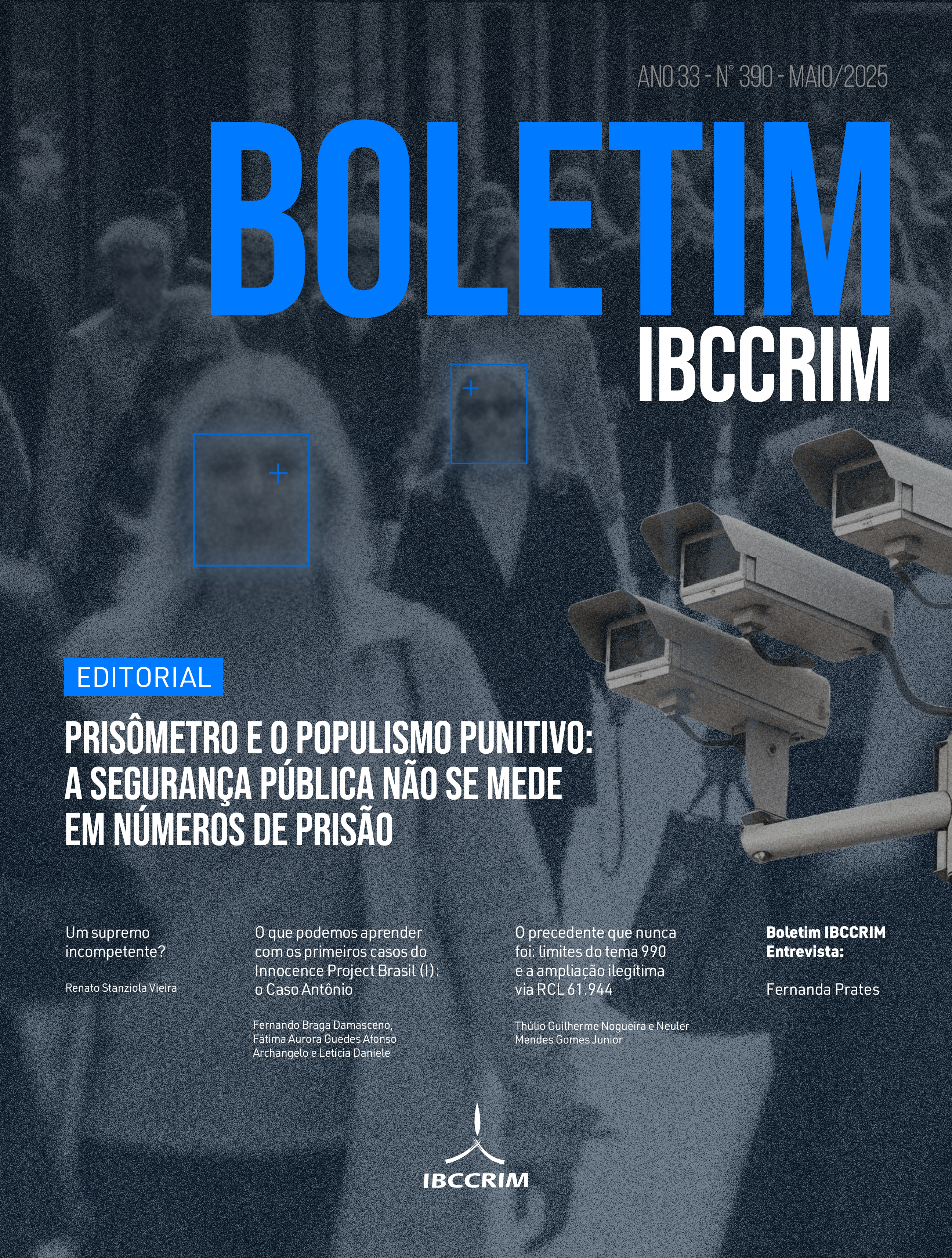What can we learn from the first cases of the Innocence Project Brazil (i): the Antônio Case
Views: 15DOI:
https://doi.org/10.5281/zenodo.15133098Keywords:
Miscarriage of justice, Eyewitness identification, Innocence Project, Criminal procedureAbstract
The article analyzes the Antônio case, the first action of the Innocence Project Brazil, which culminated in the review of a rape conviction after five years of wrongful imprisonment. The text critically examines the trial, identifying flaws in the decision-making or justificatory reasoning, especially regarding overcoming the fragility of victim identification as the only proven accusatory hypothesis. The study culminates with mapping factors that may have contributed to the error: automatic admissibility of charges, maintenance of pretrial detention, media pressure, absence of structured decision-making method, and misunderstanding of the criminal judge’s role.
Downloads
References
ACCATINO, Daniela. Atomismo y holismo en la justificación probatoria. Isonomía, n. 40, p. 17-59. México. 2014.
BARR, N.; COOPER, G.. Identifying How an Individual Becomes a Suspect: A Needed Addition to the Innocence Literature. The Wrongful Conviction Law Review, vol. 4, n. 1, p. 48-70. 2023.
BEECHER-MONAS, Erica. Evaluating Scientific Evidence: An Interdisciplinary Framework for Intellectual Due Process. Cambridge University Press, 2006
BRAGA DAMASCENO, Fernando. A motivação do juízo fático-probatório. Revista de Processo. vol. 354. ano 49. p. 95-120. São Paulo: Ed. RT, agosto 2024.
BRAGA DAMASCENO, Fernando. Pensando a qualidade do juízo fático-probatório: um modelo de evolução baseado no aprendizado com erros. Revista Brasileira de Direito Processual Penal, vol. 9, n. 3, p. 1213-1256, set./dez. 2023. https://doi.org/10.22197/rbdpp.v9i3.900
CECCONELLO, W. W., & STEIN, M. L. Prevenindo injustiças: como a psicologia do testemunho pode ajudar a compreender e prevenir o falso reconhecimento de suspeitos. Avances en Psicología Latinoamericana, 38(1), 172-188. 2020.
CECCONELLO, W. W.; FITZGERALD, R. J.; STEIN, L. M.. Efeitos do Alinhamento Justo e Similaridade de Rostos no Reconhecimento de Pessoas. Psico-USF, v. 27, n. 1, p. 181–191, jan. 2022.
CECCONELLO, William Weber; DE AVILA, Gustavo Noronha; STEIN, Lilian Milnitsky. A (ir) repetibilidade da prova penal dependente da memória: uma discussão com base na psicologia do testemunho. Revista Brasileira de Políticas Públicas, v. 8, n. 2, p. 1057-1073, 2018.
FONDEVILA, Gustavo; QUINTANA-NAVARRETE, Miguel. (2020). Determinantes de la sentencia: Detención en flagrancia y prisión preventiva en México. Latin American Law Review. 49-72. 10.29263/lar04.2020.0
GASCÓN ABELLÁN, Marina. Los hechos en el derecho: bases argumentales de la prueba. Madrid: Marcial Pons, 2010.
GLOECKNER, Ricardo Jacobsen. Prisões cautelares, confirmation bias e o direito fundamental à devida cognição no processo penal. Revista Brasileira de Ciências Criminais, v. 23, n. 117, p. 263-286. 2015.
GONZÁLEZ LAGIER, Daniel. Emociones sin sentimentalismo: sobre las emociones y las decisiones judiciales. Lima: Palestra, 2020
LEIPOLD, Andrew D., How the Pretrial Process Contributes to Wrongful Convictions. American Criminal Law Review, Vol. 42, pp. 1123-1165, 2005.
PASSANANTE, Luca. Motivazione della sentenza e accertamento della verità nel pensiero di Michele Taruffo. Revista Ítalo-Española de Derecho Procesal, Madrid, v. 1, 2021. p. 85-86.
TAKEUCHI, Daniele Liberatti Santos. Viés confirmatório e originalidade cognitiva: uma abordagem empírica a respeito do modelo ideal de admissibilidade da acusação no processo penal brasileiro. Londrina: Thoth, 2024
TANAKA, James W.; FARAH, Martha J. The holistic representation of faces. Perception of faces, objects, and scenes: Analytic and holistic processes, p. 53-74, 2003
TARUFFO, Michele. Verdad, prueba y motivación en la decisión sobre los hechos. México: Tribunal electoral del Poder Judicial de la Federación, 2013.
TOSCANO JR, Rosivaldo. O cérebro que julga: neurociência para juristas. Florianópolis: Emais, 2023.
Downloads
Published
How to Cite
Issue
Section
License
Copyright (c) 2025 Fernando Braga Damasceno, Fátima Aurora Guedes Afonso Archangelo, Letícia Daniele Bossonario

This work is licensed under a Creative Commons Attribution-NonCommercial 4.0 International License.
Copyright of published articles belongs to the author, but with journal rights over the first publication and respecting the one-year exclusivity period. Authors may only use the same results in other publications by clearly indicating this journal as the medium of the original publication. If there is no such indication, it will be considered a situation of self-plagiarism.
Therefore, the reproduction, total or partial, of the articles published here is subject to the express mention of the origin of its publication in this journal, citing the volume and number of this publication. For legal purposes, the source of the original publication must be consigned, in addition to the DOI link for cross-reference (if any).

 Português (Brasil)
Português (Brasil)
 English
English
 Español (España)
Español (España)










